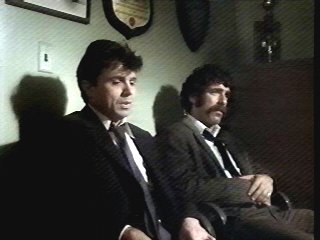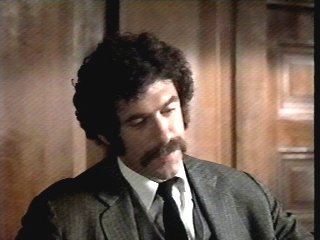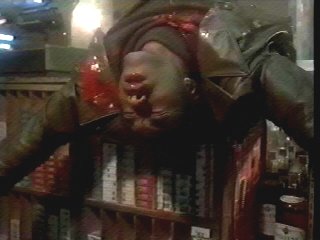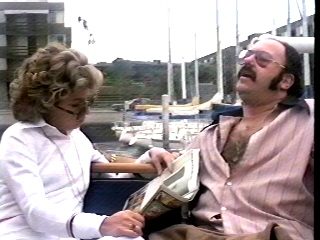
|
|
|
|
|
|
|
|
|
|
|
|
|
(1974) Director: Peter
Hyams
The buddy movie has been around for ages, starting even
before Laurel and Hardy first hit the screen. However, the buddy-cop
movie, at Though I didn't like Freebie And The Bean, I did admire it for steadfastly going down a different path than usual, for it not giving its audience a tried and true path. You could also say that about the buddy-cop movie Busting, even more so. Unlike Freebie And The Bean and The Super Cops, you can't easily classify Busting, even when you allow yourself to use a slash, like when you give the accurate label of "action/comedy" in classifying those two other movies. Busting has some action scenes, yes, but you can't call it a straight action movie. It also has a number of scenes played for laughs, but you also can't call it a straight comedy - or for that matter, an action/comedy. One reason is that there is a third genre intertwined in the movie, which is straight bonafide drama. It's a kind of drama with a strong enough power that it results in many moments where the movie stops clowning around with instant audience-pleasing material like shootouts and wacky cop antics and instead takes itself very seriously. Another way that Busting isn't your
typical buddy-cop movie is that, even when we realize we are getting
three genres for the price of one, it refuses to blend and present them
in a manner that would be palatable for most people in the audience.
Though there is an evolving story of sorts here, there's still almost a
randomness in how the movie instantly changes its tone every few
minutes, so even though we sort of know where the movie is eventually
headed to, we have no idea just what paths we'll be taking there. To
say it's quite a disconcerting journey is something of an
understatement. You might be wondering how a movie made up of three
vastly different genres all shuffled together to produce a story with a
tone audiences are not used to could possibly work. Well, as you might
have guessed, with all this (and a lot more) on its plate, the finished
movie is far from perfect. With all this shuffling around, there are
times when even the movie isn't sure just how something should be
played out, and even with 95 minutes at its disposal it is nowhere able
to flesh everything out to a proper depth, or even to lead e This time around, the two buddy-cops are not exactly close in a friendship aspect, but share their closeness with their equal determination and chosen tactics when it comes to law enforcement. They are Keneely (Gould) and Farrel (Blake), and instead of being the typical partnership that's more or less equal, Keneely does most of the decision-making, and Farrel actually doesn't seem to mind about this arrangement. The two of them are also not the typical glamorous homicide or other capital crime detectives, but they are members of the vice squad, and are in charge of cleaning up the more petty but scummy side of criminal society. At first it almost seems that they are just especially determined vice cops, with all of their constant goings to obvious places like back-room "massage" parlors, as well as an equal number of less likely places like dentists' office, in order to bust every cheap hooker and petty drug dealer they possibly can. Though after seeing them go through several such busts and learning a little detail about something else they are concerned with, it soon becomes clear they actually have a higher purpose with all these small-time busts. Every perp they encounter is actually working for a figure named Rizzo (Garfield, excellent as a mocking little runt with absolutely no fear of the police), a small-time mobster but one with some clout. But each time Kenelly and Farrel think they have made a step towards putting Rizzo away for good, something gets in their way and they can't go any further. When they find the little black book belonging to the Rizzo hooker they bust near the beginning of the movie, it turns out also to have the names and addresses of people who work with the District Attorney and the police department. Subsequently, the two find the book goes "missing" in evidence, and their captain all of a sudden strongly believes they made a mistake in procedure during the bust, and strongly suggests that in court next day that they "admit" they made a mistake during the preliminary hearing for the hooker. With this and every subsequent attempt they make to put Rizzo away, they find themselves humiliated afterwards by the department (which Rizzo has influence with in the higher unseen ranks) assigning them embarrassing busts like a gay makeshift bawdy house ,or sitting for hours on end in a park's restroom for a supposed pervert on the prowl - which not only frustrates their investigations of Rizzo, but makes them more frustrated at being such lowly cops. Though this plot description may make Busting
sound like one of those many other
honest-cop-against-the-system cop movies, it actually isn't as
clean-cut as that. In fact, in real life there is a high burnout rate for people in the vice division, with the futility described above playing a big part in it. It's obvious that Kenelly and Farrel are getting close to that stage, even if they don't want to admit it to themselves. Though it may seem a strange bit of casting to have Elliot Gould as a vice cop, and upon first glace you have to laugh at him for trying to look tough but at the same time having a goofy-looking mustache, it's surprising how quickly you adjust and accept him in this role. As the movie goes on, you sense that this is a character bottling up more and more rage and frustration as each day goes by, and only seldom does he let out some steam - though not in a constructive way, as when after a humiliating session in court he starts throwing punches in the hallway at a pimp that he's never seen or heard of before. At the same time, Gould also brings in a world-weariness to his character that makes him believable as someone who has seen and done it all over and over, and is just getting tired of it all. This is further brought home in an interesting monologue about his early days as a beat cop, when even then being in the force was more trouble that it was worth. Gould does a fine job in making Kenelly a real person, which is fortunate because (aside from that monologue) you learn absolutely nothing about these guys. You never find out just why these guys are so determined to put this particular small-time mobster away, or anything about their backgrounds. They don't even seem to have any life outside of their jobs. Not only does the screenplay not go into detail about these two cops, it also strangely sets the movie up as a buddy-cop movie when in fact most of the focus is on Kenelly. For some reason, the screenplay has Farrel more or less just standing nearby in many scenes, and in other scenes he's simply not there. He's almost has no presence in the movie, which is not helped by the fact Blake is of short stature, and even Gould towers over him. Still, Blake is given a few opportunities to briefly stand in the spotlight with some humorous material, including a funny sequence where he spooks the customers at Rizzo's club, and some amusing comments, including a sly reference to his days as one of the Our Gang kids. Those are not the only laughs to be found in Busting.
It's inevitable that with the two Hyams (who also wrote the screenplay) is remarkably assured behind the camera for his first theatrical movie. He captures the unglamorous realism of police work, from humdrum "How ya doin'?" conversations to scrounging around in filthy back alleys and cramped and darkened backroom massage parlors. He also repeatedly uses a neat camera trick that works in both the action and non-action sequences, where (without cuts) the camera takes a long journey with whatever character is walking or running, moving backwards while the character moves towards the camera. When this is going on you feel a sense of realism; you get a better feeling of the actual environment the character is in, and with the character being seen at such lengths without any artificial intrusion, you temporarily forget that what you are seeing was actually all planned out beforehand by filmmakers. There are some parts of the movie where it's clear Hyams still had a few things to learn, like choreography (try to make sense of the barroom brawl, as well as the shootout at the supermarket), which does add to the messiness factor. But if Busting is often a mess, at least it is a watchable mess, one that keeps your eyes focused long enough to realize there are still plenty of good things buried inside.
Check for availability on Amazon (VHS) See also: Back In Action, Keaton's Cop, Your Three Minutes Are Up |
 least in the format
that we are now most familiar with, only really got started in the
'70s. What's really interesting to note is that even though present-day
buddy-cop movies don't seem all that far removed from each other, all
of them sharing the same conventions most moviegoers are now very
familiar with, the buddy-cop movies in the '70s come across today in
comparison as being more fresh and memorable, and not as the
originators of clichés as you might imagine. The Super Cops
(starring Ron Leibman and David Selby), based on an
actual cop duo, is an effective mix of laughs and deadly serious
moments, and is well worth seeing - that is, if you can somehow find a
copy of it. Freebie And The Bean
(starring James Cann and Alan Arkin) is an
unforgettable mix of action and humor, though not in the way intended
by its producers, since its humor is often very mean-spirited and its
action sequences are not only extremely brutal, but the attitude
towards them is so callous that even the one-liner quipping action
heroes of today would raise their eyebrows at the sight of this
carnage.
least in the format
that we are now most familiar with, only really got started in the
'70s. What's really interesting to note is that even though present-day
buddy-cop movies don't seem all that far removed from each other, all
of them sharing the same conventions most moviegoers are now very
familiar with, the buddy-cop movies in the '70s come across today in
comparison as being more fresh and memorable, and not as the
originators of clichés as you might imagine. The Super Cops
(starring Ron Leibman and David Selby), based on an
actual cop duo, is an effective mix of laughs and deadly serious
moments, and is well worth seeing - that is, if you can somehow find a
copy of it. Freebie And The Bean
(starring James Cann and Alan Arkin) is an
unforgettable mix of action and humor, though not in the way intended
by its producers, since its humor is often very mean-spirited and its
action sequences are not only extremely brutal, but the attitude
towards them is so callous that even the one-liner quipping action
heroes of today would raise their eyebrows at the sight of this
carnage.  verything
to some kind of acceptable resolution, whether the thing itself is
improperly constructed or not. Yet at the same time it would be wrong
to call the results uninteresting, because even if it's a shaky package
its mishmash nature keeps you watching; you certainly can't can't say Busting
is ever boring. Though this may not have been the
primary way the producers (the legendary Robert Chartoff / Irvin
Winkler team) intended this movie to be entertaining, that's where I
got much of my enjoyment out of, and the main reason why I feel the
movie is worth a look.
verything
to some kind of acceptable resolution, whether the thing itself is
improperly constructed or not. Yet at the same time it would be wrong
to call the results uninteresting, because even if it's a shaky package
its mishmash nature keeps you watching; you certainly can't can't say Busting
is ever boring. Though this may not have been the
primary way the producers (the legendary Robert Chartoff / Irvin
Winkler team) intended this movie to be entertaining, that's where I
got much of my enjoyment out of, and the main reason why I feel the
movie is worth a look. Even though Kenelly
and Farrel certainly will get a good amount of sympathy from viewers
because of all the crap they have to take from not just criminals but
also the higher-ups in the police force, and gain our admiration for
managing to stand up to all this crap time and again, it's unlikely
that any viewer will totally embrace these guys - and this quirk in
their characters makes them more interesting than the usual movie cop
in their shoes. Being determined is one thing, but even the more
gung-ho members of the audience will probably question whenever the two
decide to break procedure or the law. There's the expected sequence
when they break into someone's apartment without a warrant (in this
case in order to look for drugs), and then things get more personal
when they arrest the hooker in the beginning of the movie. When she
denies having a "little black book", Kenelly and Farrel then start
purposely smashing things at random in her apartment, since they have
the right to "search" her belongings for a book - which, of course,
soon gets her to 'fess up where the book is hidden. You also have to
question the part of these men that refuses to see that going the extra
mile time and time again won't really make a difference in the end. As
it's pointed out later in the movie, how is society helped when a $10
hooker is busted? The movie shows that she'll soon be out on the street
again, and besides, the arrangements between her and her clients are
mutual. You could even say the same thing about drug dealers. For such
criminals like these, you don't even need a Rizzo to be running them,
since demand for illicit materials will always ensure a supply one way
or another.
Even though Kenelly
and Farrel certainly will get a good amount of sympathy from viewers
because of all the crap they have to take from not just criminals but
also the higher-ups in the police force, and gain our admiration for
managing to stand up to all this crap time and again, it's unlikely
that any viewer will totally embrace these guys - and this quirk in
their characters makes them more interesting than the usual movie cop
in their shoes. Being determined is one thing, but even the more
gung-ho members of the audience will probably question whenever the two
decide to break procedure or the law. There's the expected sequence
when they break into someone's apartment without a warrant (in this
case in order to look for drugs), and then things get more personal
when they arrest the hooker in the beginning of the movie. When she
denies having a "little black book", Kenelly and Farrel then start
purposely smashing things at random in her apartment, since they have
the right to "search" her belongings for a book - which, of course,
soon gets her to 'fess up where the book is hidden. You also have to
question the part of these men that refuses to see that going the extra
mile time and time again won't really make a difference in the end. As
it's pointed out later in the movie, how is society helped when a $10
hooker is busted? The movie shows that she'll soon be out on the street
again, and besides, the arrangements between her and her clients are
mutual. You could even say the same thing about drug dealers. For such
criminals like these, you don't even need a Rizzo to be running them,
since demand for illicit materials will always ensure a supply one way
or another. going undercover in
some crazy situations (such as posing as homosexuals in that gay bawdy
house), there are bound to be some humorous moments during their
investigations. At the same time, there are moments less pleasant,
moments with levels of violence so strong that even today's audiences
will be somewhat taken aback by the sight of it all. Bullets in this
movie go straight through people and leave blood-gushing wounds at the
entry and exit points. One scene later in the movie is less bloody, but
is even more uncomfortable to sit through, with a character jumped from
out of nowhere and brutally beaten by his attackers - we sit through
every punch, and share his agony. And once it's over and we think we
have a chance to let our guard down, the movie almost immediately
afterwards sneaks in another smack upon us. Indeed, from that point on
the sense of tension and urgency starts to climb even higher than it
previous has, and we seriously start to wonder if Kenelly and Farrel
are over their heads - there is a real feeling that not only will they
be unsuccessful in their case, they might be unsuccessful in keeping
their careers, as well as their lives.
going undercover in
some crazy situations (such as posing as homosexuals in that gay bawdy
house), there are bound to be some humorous moments during their
investigations. At the same time, there are moments less pleasant,
moments with levels of violence so strong that even today's audiences
will be somewhat taken aback by the sight of it all. Bullets in this
movie go straight through people and leave blood-gushing wounds at the
entry and exit points. One scene later in the movie is less bloody, but
is even more uncomfortable to sit through, with a character jumped from
out of nowhere and brutally beaten by his attackers - we sit through
every punch, and share his agony. And once it's over and we think we
have a chance to let our guard down, the movie almost immediately
afterwards sneaks in another smack upon us. Indeed, from that point on
the sense of tension and urgency starts to climb even higher than it
previous has, and we seriously start to wonder if Kenelly and Farrel
are over their heads - there is a real feeling that not only will they
be unsuccessful in their case, they might be unsuccessful in keeping
their careers, as well as their lives.